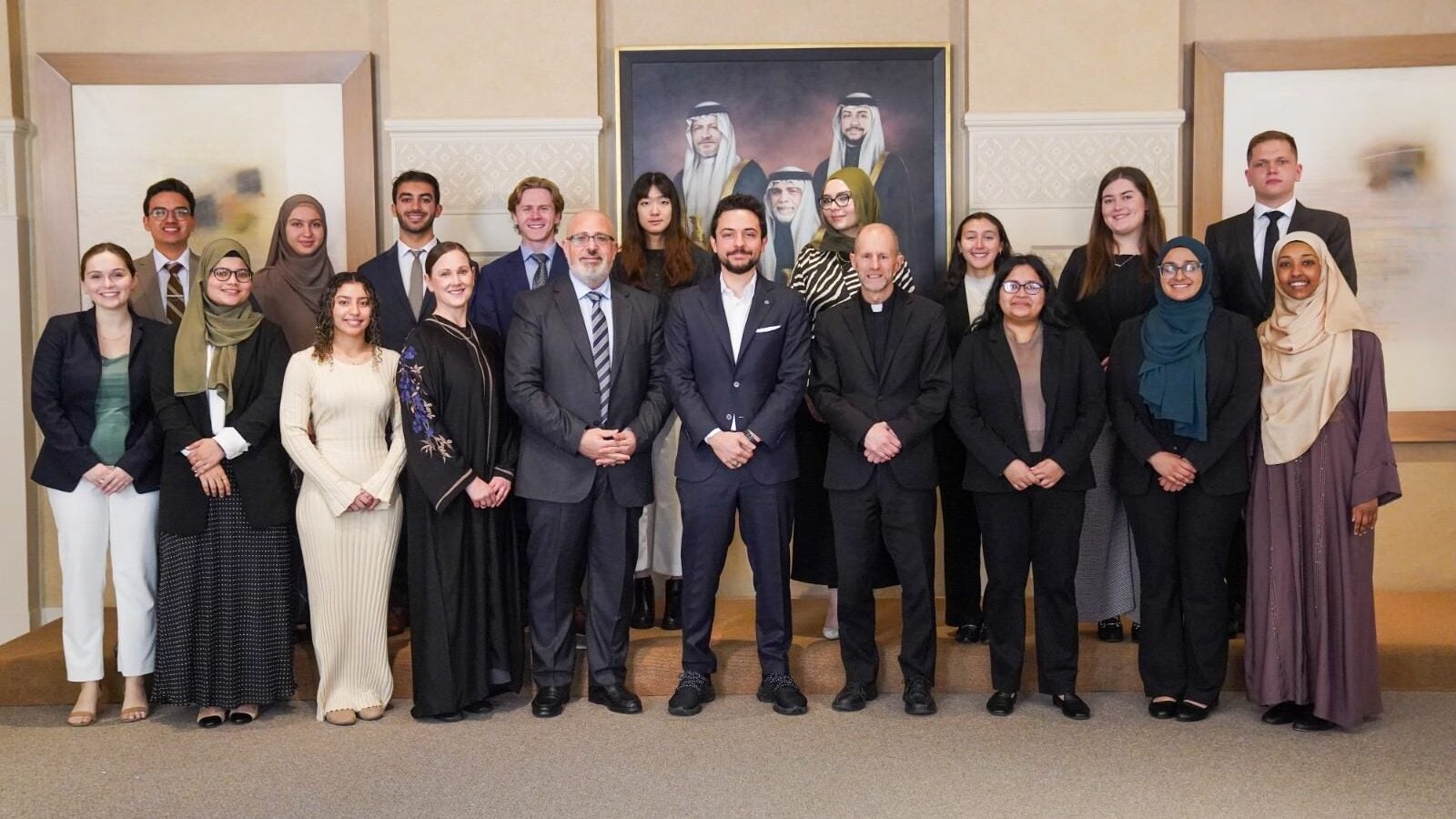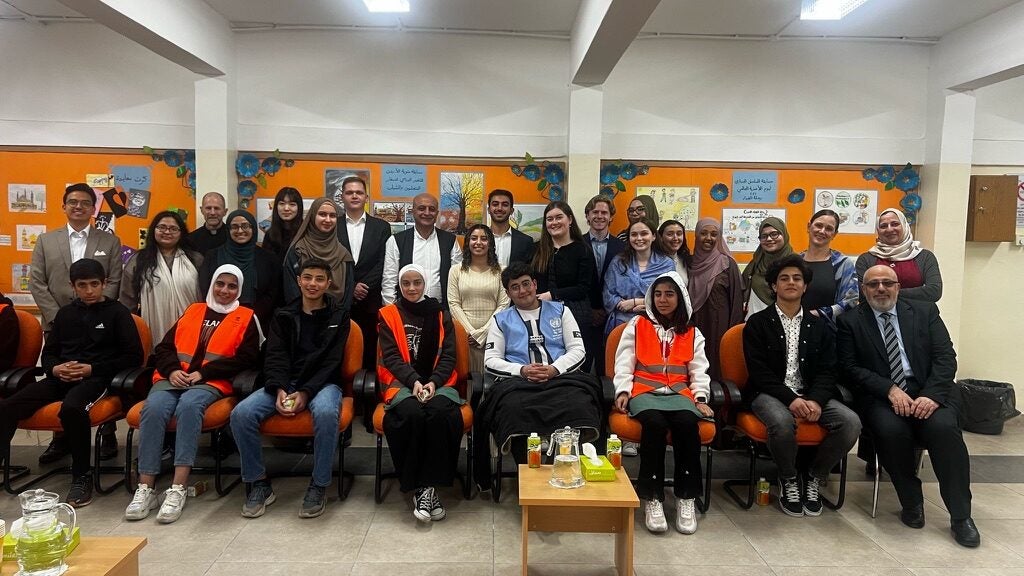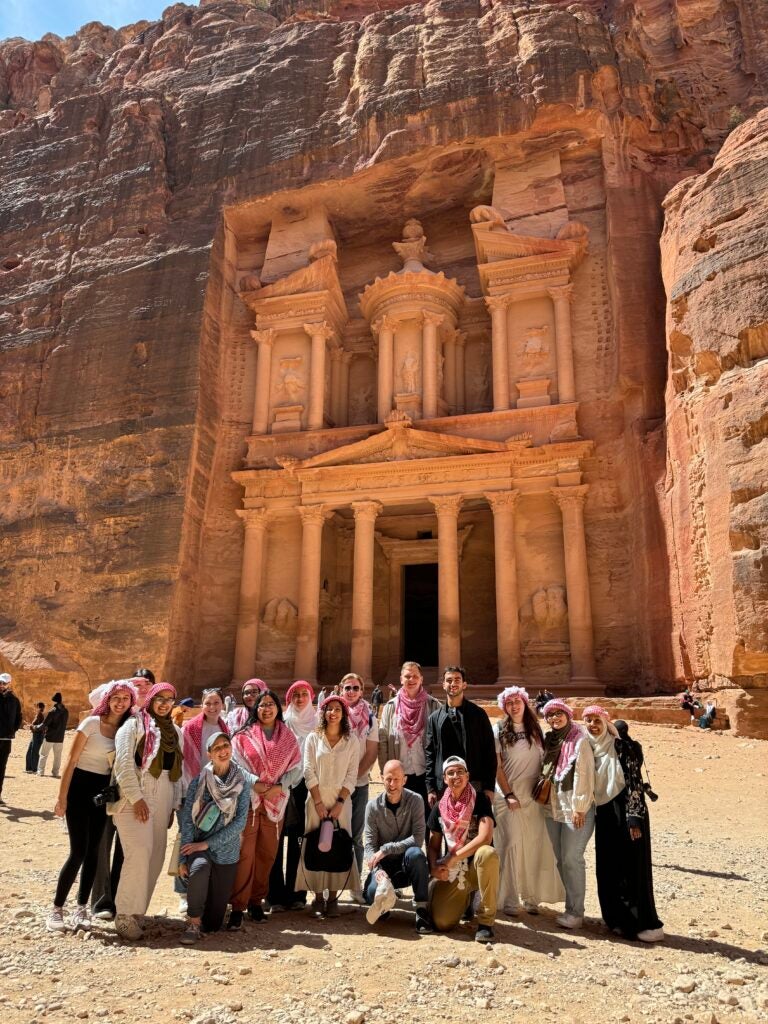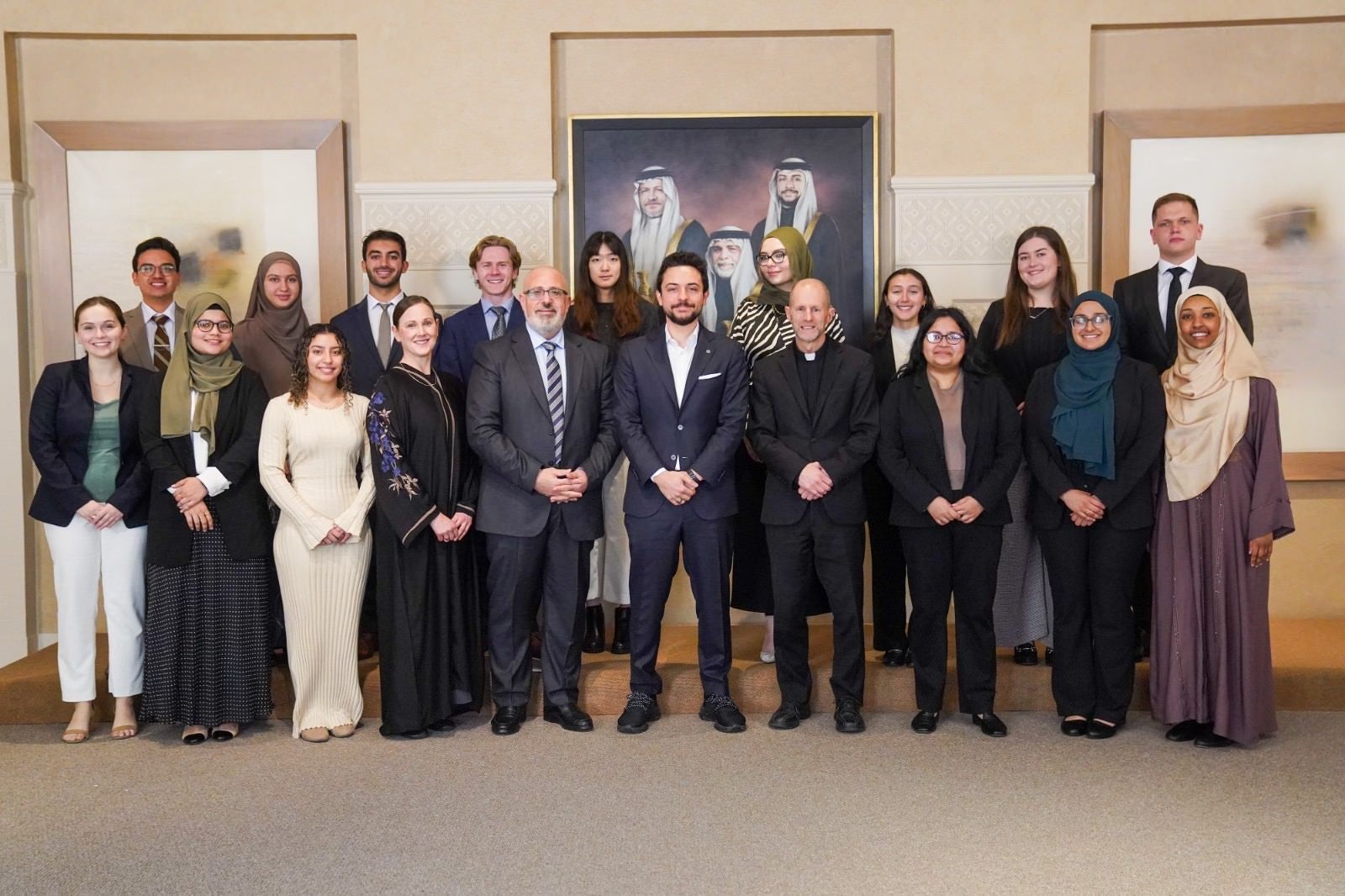Impactful Immersion: Georgetown’s Magis Trip to Jordan
Faith at the Crossroads: Religious Encounter in Jordan
By Jennon Bell Hoffman

His Royal Highness Crown Prince Al Hussein bin Abdullah II (SFS’16),(center) surrounded by trip participants and leaders (Photo ©2024 HRH Crown Prince Al-Hussein bin Abdullah II).
In the fall of 2023, as Georgetown students finished their applications for the Magis Immersion Seminars (MIS), war broke out in Gaza. As the conflict continued on its destructive path, the decision was made to change the MIS trip slated for Jerusalem to Jordan, an area overflowing with cultural and religious diversity.
For students of the seminar “Faith at the Crossroads: Religious Encounter in Jordan,” led by Dr. Ryann Craig, Imam Yahya Hendi, and Fr. Matthew Carnes, S.J., the shared experience of traveling throughout Jordan was an exercise in duality: an experience that both challenged and enriched them, and opened the dialogue about differences of religion, and the similarities that bind us deeper.
The structure of a Magis Immersion Seminar begins in the Spring semester in a small classroom setting, where students learn about the historical and cultural context of the sites they will visit and start to explore their own reasons for going on the trip.
“I went to Catholic school my entire life, and even though we learned about faith and how to question faith, it was mostly from the Catholic or Jesuit perspective,” Liam Mason (C’26) says. “I signed up for the class because I wanted to broaden my perception of what religion is, what it means to people, how it affects my life and others, and to enhance my faith and my own spirituality.”
Janeeta Shaukat (H’24) appreciated how the class gave the students a platform to talk about their faith and beliefs by asking and answering questions. “I’m a part of the Muslim faith, but a lot of my colleagues are Christians and atheists. While there is some mutual understanding here at Georgetown, we never really openly talk about, ‘What does your faith mean to you? Or what does it mean to me, or what questions do I have for you?’ This was an interesting place to be because Jordan is a place of religious tolerance, where there’s a big population of both Muslims and Christians; it would be a great example for us to really learn from them.”
Isabel Powell (C’24), an atheist, was apprehensive about her background and if it would be a barrier to her experience but was not surprised when the faith differences led to more open and honest conversations. “At Georgetown, I’ve come to learn that religion plays a very large role in people’s lives regardless of whether or not it has that role in mine. I think it actually worked really well because the theme of this class was essentially Muslim-Christian understanding and interfaith dialogue. It felt like a very valuable learning opportunity.”
The itinerary for the 10-day trip was packed with sites, meetings, and home visits, where students met with interfaith scholars and government officials, shared meals with refugees, and bonded with locals and one another.
One particular day had almost a whiplash effect for Liam, Isabel, and Janeeta. Due to a scheduling coincidence, the day began with an audience with His Royal Highness Crown Prince Al Hussein bin Abdullah II (SFS’16) immediately followed by a visit to a UNRWA (United Nations Relief and Works Agency) school and a refugee camp. Isabel describes the feeling:

Hoyas visiting a UNRWA school and its students (Photo courtesy of Isabel Powell)
“We were all dressed up, in heels and suits, and they’re giving us drinks and offering gifts, I shake [the Crown Prince’s] hand, and we talk to him for half an hour. It’s incredible and impressive; there’s a lot of grandeur to it all. And then we get on the bus, and we drive to a Palestinian refugee camp, and we go to an UNRWA school, which are being used but now no longer funded, and we were told we can’t walk around this camp because there’s so much tension with the recent conflict going on. There’s so much unrest and we’re hearing about the health and school issues… The timing wasn’t purposely made to have that dichotomy, but you can’t not notice it. We’re standing on this roof and overlooking the settlement, and Imam Hendi turns to us and says, ‘This is what Gaza looks like. Just imagine that a bomb fell right there.’ And it became very real.”
Complicated feelings and introspection are a part of what makes Magis Seminars so impactful. The focus of MIS trips is to build relationships, cultivate awareness of social justice and engage in reflection and solidarity with the poor. It is putting the ideal into practice. Liam, too, felt the tug of guilt and mixed with humbling gratitude when he was offered plates of food and gifts from a refugee family. His initial reaction was to politely decline the offerings, knowing that the food they were sharing was all the family had.
“During reflection, Imam Hendi told us how he wasn’t hungry, and also he didn’t want to accept the jelly but he knew that it would make them so happy, that showing appreciation for their hospitality was more important,” says Liam. “In the moment, I had no clue, I didn’t really understand it, but then I was able to see the appreciation, the acceptance, the gift it can be to accept another’s offerings.”
Sharing food and open dialogue was a recurring theme in the Jordan trip, whether amongst the students themselves, with locals, or during home visits.
“For me, I think we learned the most when we were eating dinner with families. We had dinners with Christian families. We had dinners with Muslim families. Some of them are Jordanian, some of them are Syrian. And it was really nice to sit down and talk to them about ‘What does Jordan mean to you? What does this interfaith dialogue mean to you? What does it look like in your house and your neighborhood?’” says Janeeta.
She adds, “Sometimes when you go to these places, and you see people going through a lot of hardship, it’s their faith that keeps them moving. They give because they trust that God will bring them more. They’re so hospitable, whoever we met, whether a politician or whether a family, they were adamant about showing us that Jordan is very accepting and open.”
In a place like Jordan, which is teaming with cultural, geographic, and historical context, there are numerous ways to connect with the place and with each other and bring those impressions back to their lives on campus. For a group of students, this trip became not just a destination, but a profound journey of discovery, empathy, and responsibility.
“A lot of the people we visited and spoke to were Muslim and they talked about how there are certain stereotypes about the Arab world, about the Middle East, about Muslims that they wanted to dispel. One of the speakers said, ‘It almost feels like we’re always fighting. We always have to fight against something. We can’t fight for something with you guys, meaning we always have to fight against the stereotype that we’re terrorists, that we can never fight for peace, or we can never fight for justice.’ As a Muslim, that was eye-opening to me, because it showed you that the stereotypes we have here, how they extend beyond just the Americas,” says Janeeta.
“I also think that a lot of the students want to take that with us and make sure that whenever we speak about Jordan and about this experience, we would share what we saw, the truth of the experience, beyond what is said in the media.”

Hoyas in the ancient city of Petra (Photo courtesy of Isabel Powell)
Liam adds, “There were so many opportunities even outside of the itinerary to fully engage in the culture around us. At night, we would go out and get shawarma or falafel, go shopping, just explore the city together and venture out. Three of my classmates spoke Arabic and were able to communicate with a lot of the people and I was constantly asking questions, everyone we met was gracious and happy to answer my questions, and excited by the fact that I was curious about everything.”
“It was really impactful for me being able to talk with people across the world. And it’s a little cliché but the more I talked to people, the more it felt very familiar in a way. I felt like we had more things in common than differences, and it was very impactful for me to realize.”
As a senior, Isabel feels her time in Jordan was an appropriate culmination of her time at Georgetown.
“I’m in the 12th hour of my time at Georgetown and having an opportunity like this—to meet the people I did and make a bunch of new friends and connections, to learn about a culture and different faith systems I didn’t know before, to be part of these important conversations—it is really an amazing experience I am so grateful for,” says Isabel. “We all committed and went with the right intentions—to be open and willing to be challenged and surprised and it really worked. This is an experience I’ll keep with me forever.”
Liam Mason (C’26) is studying Political Economy and Math.
Isabel Powell (C’24) is studying Biology of Global Health, and Justice and Peace Studies.
Janeeta Shaukat (H’24) is studying Global Health and Justice and Peace Studies.
Dr. Ryann Craig is Special Assistant to the Vice President for Mission and Ministry & Director of Academic Initiatives.
Imam Yahya Hendi is Campus Ministry’s Director for Muslim Life.
Fr. Matthew Carnes is an associate professor in the Department of Government and the Edmund A. Walsh School of Foreign Service.
Jennon Bell Hoffmann is a freelance writer and editor living in Chicago.
- Tagged
- Jordan
- Magis
- Spring Break
